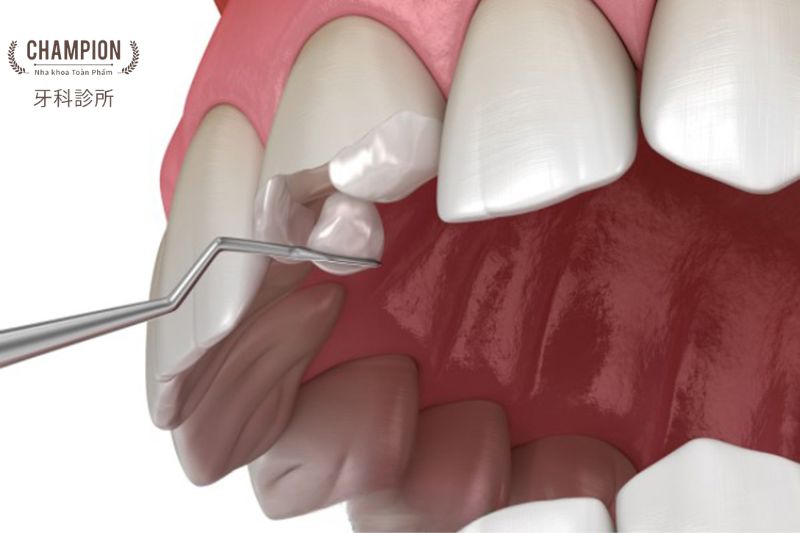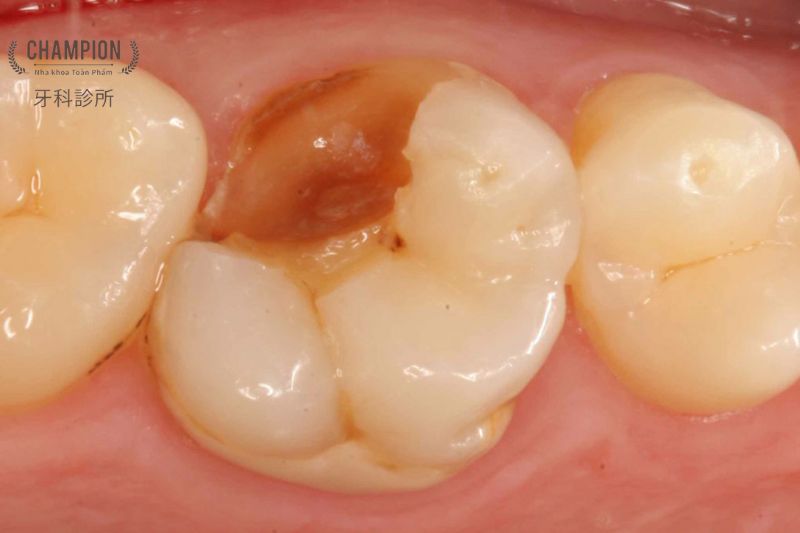Is tooth cracking dangerous? Healthy teeth are an essential part of maintaining overall health. When a tooth is cracked, even if it's a small crack, it's a warning sign that the tooth is experiencing problems.
Many people often underestimate the condition of cracked teeth, but in reality, if not treated promptly, it can lead to dangerous complications. Let's explore the risks of tooth cracking and effective prevention and treatment methods with Champion Dental!
Dangerous complications of tooth cracking if left untreated
Tooth cracking can stem from various causes, such as trauma, teeth grinding, eating hard and chewy foods, or simply due to age. Regardless of the cause, to prevent the condition from worsening, you need timely treatment. If not, tooth cracking can lead to the following dangerous complications:
Infection:
Tooth cracks create gaps where leftover food and bacteria can accumulate, causing infection. The infection can spread, affecting the tooth root and surrounding tissues, leading to severe pulpitis.
Tooth loss:
If a cracked tooth is left untreated, the crack will become deeper and more extensive over time. Eventually, the tooth may completely fracture, requiring extraction. Losing a tooth will affect your chewing ability, speech, and confidence.
Systemic complications:
If oral infections are not controlled, they can spread to other organs in the body, causing serious problems such as arthritis, endocarditis, or even blood infections.

Warning signs of tooth cracking
Early detection of tooth cracking will help you receive timely treatment and avoid unfortunate complications. Some signs that your tooth may be cracked include:
Sudden and persistent pain:
A sudden pain when chewing or when in contact with hot or cold foods is one of the most apparent warning signs of tooth cracking. This pain is usually prolonged, persistent, and uncomfortable, significantly affecting daily quality of life.
Sensitivity to temperature changes:
When a tooth is cracked, small gaps expose the nerve fibers inside, making the tooth extremely sensitive when consuming foods or drinks that are too hot or too cold, affecting the eating experience.
Formation of cracks or chips on the tooth surface:
Looking closely in the mirror, you may see clear cracks or chips on the tooth surface. This is the most visual and distinct sign that your tooth is cracked. However, even if no external cracks are visible, there's still a possibility that the tooth is cracked internally and needs to be examined by a dentist.

When should you see a dentist?
If you experience one or more of the following signs, see a dentist immediately for examination and prompt treatment:
Suspecting a cracked tooth based on the above signs
If you feel pain or sensitivity when chewing or biting food, or when consuming hot or cold items, this could be a sign of a cracked tooth. Upon detecting these symptoms, you should see a dentist early for an accurate diagnosis and appropriate treatment.
Prolonged tooth pain with unknown cause
If the pain lasts more than 1-2 days without finding the cause or doesn't subside with common painkillers, this may be a sign of serious dental issues such as cavities, pulpitis, periodontitis, etc. In this case, seeing a dentist is necessary to identify the root cause and take suitable measures.
Tooth sensitivity to hot/cold foods
Tooth sensitivity is a condition where the dental pulp (the soft tissue inside the tooth) is overly stimulated by external factors such as hot, cold, sweet, or sour foods/drinks. Worn or cracked tooth enamel is a common cause of this condition. When experiencing prolonged sensitivity during eating and drinking, you should consult a dentist for advice on remedies.
Chipped or fractured tooth
A chipped or fractured tooth can be caused by various factors such as accidents, excessive biting force, severe cavities, etc. This condition needs to be treated as soon as possible because it affects aesthetics and chewing ability while allowing bacteria to enter, causing more severe cavities and infections. The dentist will examine and suggest suitable solutions such as tooth filling or crowning.

>> See more: 6 Effective Ways to Prevent Tooth Cracks You Should Know
Treatment methods for cracked teeth
Depending on the extent of the crack and the location of the affected tooth, the dentist may employ several treatment methods such as:
- Tooth filling: For small cracks in the tooth enamel, the dentist will use filling material to fill in the cracks, restoring the shape and function of the tooth. Filling also helps protect the dental pulp and prevent bacterial infiltration.
- Crowning: For more extensive cracks that affect the dentin and soft tissue inside, the dentist may suggest crowning the tooth with materials like porcelain or composite. This helps reinforce the tooth structure, avoid fractures, and protect the pulp from external impacts.
- Root canal treatment: If the tooth damage is too severe and bacteria have invaded the pulp causing inflammation, it may be necessary to remove the pulp, seal the root canal, and restore the tooth structure with a post and porcelain crown.
- Tooth extraction: For teeth with cracks extending to the root, which are beyond restoration, the dentist may have to extract them and replace them with prosthetics such as bridges or implants.
In addition to treatment at the dental clinic, maintaining good oral hygiene, avoiding chewing on very hard foods, wearing a mouthguard when participating in contact sports are measures that help prevent the recurrence of tooth cracks. Regular check-ups every 6 months are also crucial for early detection and treatment of dental issues.
Preventing tooth cracks
Prevention is always better than cure. To reduce the risk of tooth cracks, you should pay attention to the following measures:
Limit eating hard, chewy foods
Hard, chewy foods like nuts, hard biscuits, or animal bones can put pressure on teeth, leading to cracks. Be careful when eating these foods and avoid gnawing on hard objects.
Avoid teeth grinding and clenching
Teeth grinding and clenching are bad habits that put great pressure on teeth, causing cracks. If you have these habits, find ways to stop them or use a night guard to prevent grinding.
Have dental check-ups every 6 months
Having dental check-ups every 6 months will help the dentist detect early signs of tooth cracks or any other oral issues. This allows for timely intervention, preventing more serious complications.

Conclusion
Are cracked teeth dangerous? The answer is yes. If not detected and treated promptly, cracked teeth can lead to serious complications, affecting not only oral health but also overall health.
Therefore, as soon as there are suspected signs of a cracked tooth, it is crucial to visit the dentist for examination and treatment. At Champion Dental, with our experienced team of doctors and modern equipment, we will help you accurately detect the condition of your teeth and provide a suitable treatment plan.
Don't let cracked teeth become a nightmare for your health and appearance. Contact Champion Dental immediately to receive timely care and treatment, regaining a healthy, beautiful and confident smile.
Vietnamese & English: (028) 5411-2295
中文: (028) 5411-2297 172 Nguyen Luong Bang, Tan Phu Ward, District 7, Ho Chi Minh City.
Fanpage: Champion Dental Clinic 牙科診所
Zalo: Champion Dental Clinic
Youtube: Champion Dental Clinic 牙科診所
 Champion Dental Clinic
Champion Dental Clinic



